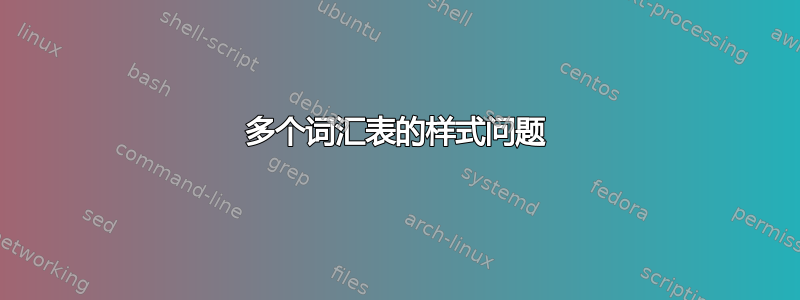
我正在处理一个非常大的文档,我想使用带有 bib2gls 的 glossaries-extra 包创建词汇表、缩写/首字母缩略词列表和索引。为了有一个更实际的例子,假设我有下一个文档.tex:
\documentclass{article}
\usepackage{amsmath}
\usepackage[colorlinks,linkcolor=blue]{hyperref}
\usepackage{cleveref}
\usepackage[
stylemods={all},
record,
index,
abbreviations,
nohypertypes={index}
]{glossaries-extra}
\begin{filecontents}{glossary.bib}
% Encoding: UTF-8
@entry{duck,
name = {duck},
description = {a waterbird with webbed feet}
}
@entry{parrot,
name = {parrot},
description = {mainly tropical bird with bright plumage}
}
@entry{dummy,
name={dummy},
description={person who is stupid}
}
@entry{abnormal,
name={abnormal},
description={not normal}
}
@entry{zebra,
name={zebra},
description={a horse with black and white stripes}
}
@abbreviation{sra,
short = {SRA},
long = {Some Random Abbreviation}
}
@abbreviation{ttl,
short = {TTL},
long = {Time To Live}
}
@abbreviation{html,
short={html},
long={hypertext markup language}
}
@abbreviation{xml,
short={xml},
long={extensible markup language}
}
@abbreviation{svm,
short={SVM},
long={support vector machine}
}
@index{goose,
plural={geese}
}
@index{cat,
plural={cats}
}
@index{carrot,
plural={carrots}
}
@index{dog,
plural={dogs}
}
@index{giraffe,
plural={giraffes}
}
@index{rat,
plural={rats}
}
\end{filecontents}
\GlsXtrLoadResources[
src={glossary},% data in glossary.bib
sort={en-US},% sort according to 'en-US' locale
match={entrytype={entry}},% only select@entry
type={main}% put these entries in the 'main' glossary
]
\GlsXtrLoadResources[
src={glossary},% data in abbreviations.bib
sort={en-US},% sort according to 'en-US' locale
match={entrytype={abbreviation}},% only select@abbreviation
type={abbreviations},% put these in the 'abbreviations' glossary
save-locations=false
]
\GlsXtrLoadResources[
src={glossary},% data in index.bib
sort={en-US},% sort according to 'en-US' locale
match={entrytype={index}},% only select@index
type={index}% put these in the 'index' glossary
]
\begin{document}
A \gls{duck} and a \gls{parrot}. Lots of \glspl{duck}. \Gls{dummy}, \gls{abnormal} and \gls{zebra}.
\Gls{sra}, \gls{ttl}, \gls{html}, \gls{svm} and \gls{xml}.
\Gls{cat}, \gls{carrot}, \gls{dog}, \gls{giraffe}, \gls{rat} and \gls{goose}.
\Gls{sra}, \gls{ttl}, \gls{html}, \gls{svm}, and \gls{xml}.
\printunsrtglossary[style=altlistgroup]
\printunsrtglossary[type={abbreviations}]
\printunsrtglossary[type={index},title=Index,style=bookindex]
\end{document}
我有一些问题:
- 在主词汇表中,虽然我使用的是altlistgroup 样式,尚未进行分组。
- 在主词汇表中,我也希望在描述的末尾有一个点。
- 对于缩写,我希望将它们分组(例如这个文件)。另外,我希望文中的缩写链接不要带有颜色。
- 在索引中,尽管我使用的是bookindex 样式。
我花了很多时间寻找解决方案,但还是没找到。如果能得到任何帮助,我将不胜感激。
答案1
这几乎可行:
\documentclass{article}
\usepackage{amsmath}
\usepackage[hidelinks]{hyperref}
\usepackage{cleveref}
\usepackage[
nostyles,
stylemods={all},
postdot,
record,
index,
abbreviations,
nohypertypes={index}
]{glossaries-extra}
\setglossarystyle{long-booktabs}
\begin{filecontents}{glossary.bib}
% Encoding: UTF-8
@entry{duck,
name = {duck},
description = {a waterbird with webbed feet}
}
@entry{parrot,
name = {parrot},
description = {mainly tropical bird with bright plumage}
}
@entry{dummy,
name={dummy},
description={person who is stupid}
}
@entry{abnormal,
name={abnormal},
description={not normal}
}
@entry{zebra,
name={zebra},
description={a horse with black and white stripes}
}
@abbreviation{sra,
short = {SRA},
long = {Some Random Abbreviation}
}
@abbreviation{ttl,
short = {TTL},
long = {Time To Live}
}
@abbreviation{html,
short={html},
long={hypertext markup language}
}
@abbreviation{xml,
short={xml},
long={extensible markup language}
}
@abbreviation{svm,
short={SVM},
long={support vector machine}
}
@index{goose,
plural={geese}
}
@index{cat,
plural={cats}
}
@index{carrot,
plural={carrots}
}
@index{dog,
plural={dogs}
}
@index{giraffe,
plural={giraffes}
}
@index{rat,
plural={rats}
}
\end{filecontents}
\GlsXtrLoadResources[
src={glossary},% data in glossary.bib
sort={en-US},% sort according to 'en-US' locale
match={entrytype={entry}},% only select@entry
type={main}% put these entries in the 'main' glossary
]
\GlsXtrLoadResources[
src={glossary},% data in abbreviations.bib
sort={en-US},% sort according to 'en-US' locale
match={entrytype={abbreviation}},% only select@abbreviation
type={abbreviations},% put these in the 'abbreviations' glossary
save-locations=false
]
\GlsXtrLoadResources[
src={glossary},% data in index.bib
sort={en-US},% sort according to 'en-US' locale
match={entrytype={index}},% only select@index
type={index}% put these in the 'index' glossary
]
\begin{document}
A \gls{duck} and a \gls{parrot}. Lots of \glspl{duck}. \Gls{dummy}, \gls{abnormal} and \gls{zebra}.
\Gls{sra}, \gls{ttl}, \gls{html}, \gls{svm} and \gls{xml}.
\Gls{cat}, \gls{carrot}, \gls{dog}, \gls{giraffe}, \gls{rat} and \gls{goose}.
\Gls{sra}, \gls{ttl}, \gls{html}, \gls{svm}, and \gls{xml}.
\printunsrtglossary[style=altlistgroup]
\printunsrtglossary[type={abbreviations}]
\printunsrtglossary[type={index},title=Index,style=bookindex]
\end{document}
您需要什么风格的缩写?



